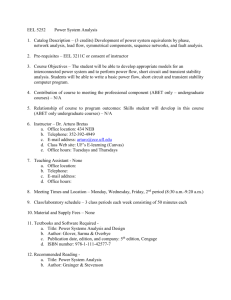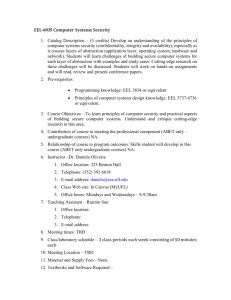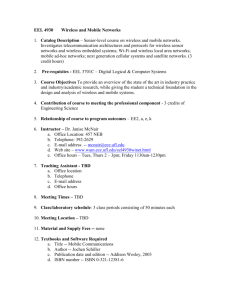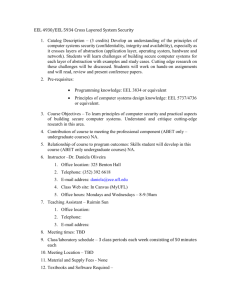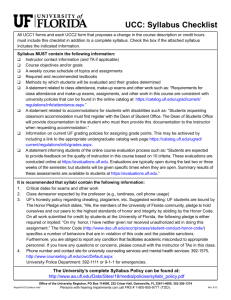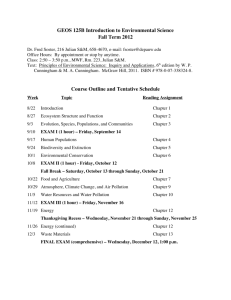EEE 4319 Introduction to Power Electronics Catalog Description – (3
advertisement
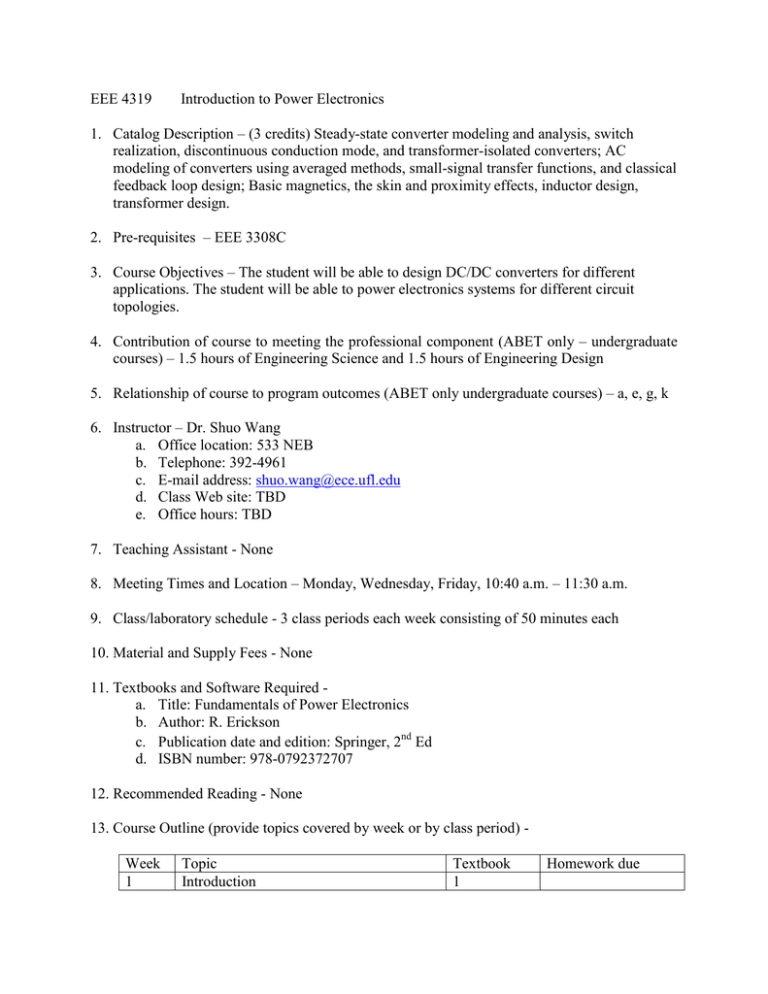
EEE 4319 Introduction to Power Electronics 1. Catalog Description – (3 credits) Steady-state converter modeling and analysis, switch realization, discontinuous conduction mode, and transformer-isolated converters; AC modeling of converters using averaged methods, small-signal transfer functions, and classical feedback loop design; Basic magnetics, the skin and proximity effects, inductor design, transformer design. 2. Pre-requisites – EEE 3308C 3. Course Objectives – The student will be able to design DC/DC converters for different applications. The student will be able to power electronics systems for different circuit topologies. 4. Contribution of course to meeting the professional component (ABET only – undergraduate courses) – 1.5 hours of Engineering Science and 1.5 hours of Engineering Design 5. Relationship of course to program outcomes (ABET only undergraduate courses) – a, e, g, k 6. Instructor – Dr. Shuo Wang a. Office location: 533 NEB b. Telephone: 392-4961 c. E-mail address: shuo.wang@ece.ufl.edu d. Class Web site: TBD e. Office hours: TBD 7. Teaching Assistant - None 8. Meeting Times and Location – Monday, Wednesday, Friday, 10:40 a.m. – 11:30 a.m. 9. Class/laboratory schedule - 3 class periods each week consisting of 50 minutes each 10. Material and Supply Fees - None 11. Textbooks and Software Required a. Title: Fundamentals of Power Electronics b. Author: R. Erickson c. Publication date and edition: Springer, 2nd Ed d. ISBN number: 978-0792372707 12. Recommended Reading - None 13. Course Outline (provide topics covered by week or by class period) Week 1 Topic Introduction Textbook 1 Homework due Principles of steady state converter analysis Principles of steady state converter analysis Equivalent circuit modeling 2.1-2.3 4.1-4.2 8 Semiconductor switches Power semiconductor devices Power semiconductor devices and switching losses Power semiconductor devices and switching losses Dynamic modeling of converters State-spacing averaging PWM modeling 9 PWM modeling 7.5-7.6 10 11 12 13 PWM modeling Bode diagram Converter small signal functions Measurement of AC transfer functions Feedback and stability Feedback and stability Controller design Controller design DCM + Project 2 related topics DCM of Buck 2 3 4 5 6 7 14 15 16 2.3-2.5 3.1-3.6 4.2-4.3 4.3 7.1-7.2, 7.4 7.4-7.5 Homework 1: 2.1, 2.9; Quiz Chap 1, 2 Homework 2: 3.3, 3.4, 3.7; Quiz Chap 3 Homework 3: 4.1, 4.2, 4.3 Quiz Chap 4 Homework 4: 4.7, 4.8 Homework 5: 7.1, 7.2, 7.4 Homework 6: 7.14 Quiz Chap 7 Homework 7: 8.2, 8.5 Homework 8: 8.15 Quiz Chap 8 Homework 9: 9.2, 9.5; Quiz Chap 9 14. Attendance and Expectations - Class attendance will be continuously checked. Homework is due one week after it is assigned. Homework will be collected at the beginning of the class on the due date. Late homework will not be accepted. Submission requirement: On each page – name, assignment number, date submitted on each page Neat circuits with appropriate labels List of given values List of starting conditions and equations Development of equations that will yield final values Numerical substitution into final equations Final answer “boxed” where appropriated Submissions may be returned without grading if you cannot meet the submission requirement. Cell phones and other electronic devices are to be silenced. No text messaging during class or exams. Requirements for class attendance and make-up exams, assignments, and other work in this course are consistent with university policies that can be found in the online catalog at: https://catalog.ufl.edu/ugrad/current/regulations/info/attendance.aspx 15. Grading – 15% 10% 20% 25% 25% 5% Homework Quizzes Midterm Exam Final Exam Project Class attendance 16. Grading Scale (e.g., 90-100 A, 85-89 B+, 80-84 B, etc.) If grades are to be curved, so state. Values should not overlap and the full grade to percentage/points map must be included. – A 93-100 A- B+ B B- C+ C C- D+ D D- E 90-92 87-89 83-86 80-82 77-79 73-76 70-72 67-69 63-66 60-62 0-59 “A C- will not be a qualifying grade for critical tracking courses. In order to graduate, students must have an overall GPA and an upper-division GPA of 2.0 or better (C or better).” Note: a C- average is equivalent to a GPA of 1.67, and therefore, it does not satisfy this graduation requirement. For more information on grades and grading policies, please visit: https://catalog.ufl.edu/ugrad/current/regulations/info/grades.aspx 17. Make-Up Exam Policy - If you have a University-approved excuse and arrange for it in advance, or in case of documented emergency, a make-up exam will be allowed and arrangements can be made for making up missed work. University attendance policies can be found at: https://catalog.ufl.edu/ugrad/current/regulations/info/attendance.aspx Otherwise, make-up exams will be considered only in extraordinary cases, and must be taken before the scheduled exam. The student must submit a written petition to the instructor two weeks prior to the scheduled exam and the instructor must approve the petition. 18. Honesty Policy – UF students are bound by The Honor Pledge which states, “We, the members of the University of Florida community, pledge to hold ourselves and our peers to the highest standards of honor and integrity by abiding by the Honor Code. On all work submitted for credit by students at the University of Florida, the following pledge is either required or implied: “On my honor, I have neither given nor received unauthorized aid in doing this assignment.” The Honor Code (http://www.dso.ufl.edu/sccr/process/student-conduct-honor-code/) specifies a number of behaviors that are in violation of this code and the possible sanctions. Furthermore, you are obligated to report any condition that facilitates academic misconduct to appropriate personnel. If you have any questions or concerns, please consult with the instructor or TAs in this class. 19. Accommodation for Students with Disabilities – Students requesting classroom accommodation must first register with the Dean of Students Office. That office will provide documentation to the student who must then provide this documentation to the course instructor when requesting accommodation. 20. UF Counseling Services – Resources are available on-campus for students having personal problems or lacking clear career and academic goals. The resources include: · UF Counseling & Wellness Center, psychological and psychiatric services, 3190 Radio Rd, 392-1575, online: http://www.counseling.ufl.edu/cwc/Default.aspx, · Career Resource Center, Reitz Union, career and job search services, 392-1601. · University Police Department, 392-1111 or 911 for emergencies 21. Software Use – All faculty, staff and student of the University are required and expected to obey the laws and legal agreements governing software use. Failure to do so can lead to monetary damages and/or criminal penalties for the individual violator. Because such violations are also against University policies and rules, disciplinary action will be taken as appropriate. We, the members of the University of Florida community, pledge to uphold ourselves and our peers to the highest standards of honesty and integrity. 22. Course Evaluation – Students are expected to provide feedback on the quality of instruction in this course based on 10 criteria. These evaluations are conducted online at: https://evaluations.ufl.edu. Evaluations are typically open during the last two or three weeks of the semester, but students will be given specific times when they are open. Summary results of these assessments are available to students at: https://evaluations.ufl.edu/results.
